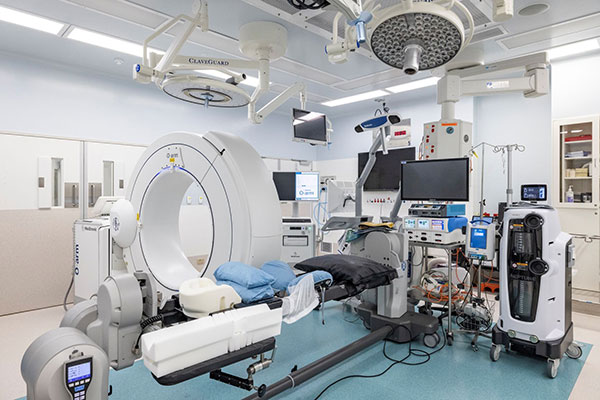Neurosurgery and complex spinal surgery
Our neuro specialists have a strong commitment to patient care, with an understanding that each patient requires development of an individual treatment program, either surgical or non-surgical.
They employ a multi-disciplinary approach, working closely with neuro-pathologists, neuro-oncologists, neuro-radiation oncologists, neuro-radiologists and ENT surgeons.
Our neurosurgical nursing staff have a knowledge base across multiple specialties that enhances a multi-faceted team approach. In addition, our ward staff have completed neuro training developed by our own learning and development team.
Sunshine Coast University Private Hospital’s team is supported by world-class spinal/neuro surgery equipment including advanced image-guided brain and spine navigational tools and state-of-the-art monitoring technology. This equipment supports our surgeons in providing excellent patient care before, during and after surgery.
The experienced team at Sunshine Coast University Private Hospital offers expert neurological care:
- Access to state of the art neuro diagnostic services,
- Referral if required to neurosurgeons 24/7,
- An 8-bed Intensive Care Unit with additional 3-bed High Dependency Unit,
- A 32-bed neurosurgical / neurological ward,
- Additionally, Sunshine Coast University Hospital partners with Nambour Selangor Private Hospital to provide a Neurological Rehabilitation Program, managed by an experienced allied health team. Ramsay can also provide care in the community and in the home pre and post discharge.
Neurosurgical Procedures
We offer minimally invasive and open techniques to treat degenerative, traumatic, neoplastic and infectious issues. Our neurosurgical procedures include but are not limited to:
- Brain Tumour Excision
- Cervical Spine Surgery
There are a wide range of conditions that require cervical spine (neck) surgery, from nerve and spinal cord pinching to instability and pain.
- Complex Spinal Surgery
- Cranial Surgery
- Disc Replacement
- Discectomy
- Fusion Surgery
- Lumbar Spine Surgery
- Minimally-invasive Spinal Surgery
- Peripheral Nerve Surgery
While the brain and spinal cord make up the Central Nervous System (CNS), surgery involving nerves outside the CNS is referred to as peripheral nerve surgery. Nerves originating in the spinal cord in the neck leave the spinal cord and form a network of nerves called the Brachial plexus before dividing into specific nerves of the arm. Similarly, nerves originating in the lumbar spine form the Lumbosacral plexus before dividing into specific nerves of the leg.
The commonest indications for peripheral nerve surgery include trauma to nerves, tumours in nerves and entrapment syndromes involving nerves. Carpal tunnel syndrome (CTS) is the commonest entrapment syndrome and Carpal tunnel release (CTR) is the most common procedure performed worldwide.
Many types of Tumours occur within nerves, but the most common are benign tumours called Schwannomas or Neurofibromas.
Trauma to nerves may take the form of sharp or blunt (stretch) injuries. Generally sharp injuries are surgically repaired early, while blunt injuries are observed for a short time to see if spontaneous recovery occurs.
- Pituitary Tumour Surgery
Surgery in and around the pituitary gland is a relatively common neurosurgical procedure which is often done through the nose. Pituitary tumours represent about 15% of all brain tumours, however behave very differently to intrinsic brain tumours. The indications for surgical treatment are hormonal imbalance, due to over production of hormone, or pressure on surrounding structures (most commonly the eye nerves). Some abnormalities within the area of the pituitary gland may be treated non-surgically or simply followed with scans.
- See our specialists here

